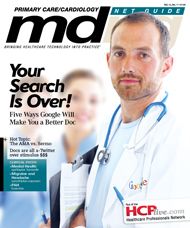Publication
Article
MDNG Primary Care
Check Up
Editors’ picks for this month’s best websites, news, resources, and online information for physicians.
Healthcare Microsharing Health IT blogger extraordinaire Phil Baumann believes Twitter’s “simplicity of functional design, speed of delivery and ability to connect two or more people around the world provides a powerful means of communication, idea-sharing and collaboration.” The question on everyone’s mind is: Can Twitter be applied usefully in the healthcare setting? Baumann says yes, and to prove it he wrote a blog post that listed 140 healthcare uses for Twitter, including:
• Disaster alerting and response
• Drug safety alerts from the FDA
• Coordinating preoperative, perioperative, and postoperative care (among pharmacy, nursing, and surgical services)
• Crowdsourcing for healthcare resources
• Daily health tips from authoritative sources
• Rural area healthcare communication
• Psychiatric “check-ins” for patients
• Data collection for tracking facility patterns (process-performance, supply-chain and staffing problems)
• Posting quick nursing assessments that feed into EMRs
• Ethical, permission-based following of patients
Read the complete list at http://philbaumann.com/2009/01/16/140-health-care-uses-for-twitter.
> follow us on twitter @ http://twitter.com/HCPLive_PCP
Anemia Institute — Physician Resources
This website focuses on “generating and sharing knowledge about anemia as a serious condition” for healthcare professionals who treat patients with anemia. Tools available to assist professionals in treating anemia include the first and only clinical guidelines for the diagnosis and treatment of anemia in a family practice context; a collection of free patient brochures, videos, and display holders for use in your office or waiting room; and the Anemia Institute Review, an overview of leading-edge research on anemia from recent publications.
The AMA Roadmap for Clinical Practice Series: Case Studies in Disease Prevention and Health Promotion
Improving Adolescent Immunizations: A Primer for Physicians
Designed to assist healthcare providers with the issues surrounding vaccinating adolescents by examining the new recommendations for adolescent immunizations and the rationale behind them. The program includes a monograph that reviews payment, maximizing rates of immunization, and ways to enhance relationships with adolescents and their parents.
Improving Immunization: Addressing Racial and Ethnic Populations
Provides background information, practical recommendations and solutions to commonly encountered questions that physicians face from diverse patient populations, and case presentations for improving healthcare delivery.
Assessment and Management of Adult Obesity
A series of 10 booklets that offer practical recommendations for addressing adult obesity in the primary care setting.
Primer on Population-based Medicine
Introduces the concept of population-based medicine as a strategy for reducing health disparities and integrating disease prevention and health promotion into routine medical care. It suggests actions that physicians can take with their patients in clinical settings and with the community as advocates for action that will help to close the gap in existing health disparities.
Health Wiki of the Month
WikiHealthCare is The Joint Commission’s interactive forum for healthcare professionals. It is designed to enable and encourage discussion and collaboration among all users for the purpose of improving healthcare quality. The purpose of WikiHealthCare is to “foster collaboration among tens of thousands and in due course of time millions of healthcare professionals,” serving as a network, linking individual users to each other and to resources that can help them meet their needs. The Performance Improvement pages link users to research (evidence-based practices, resource materials, and links to a wealth of resources) on specific topics, as well as real-world experiences posted directly by other healthcare professionals.
Telemedicine and Telehealth: State by State
Visit this site to find a full-color map of the United States; click on any state to find a concise telemedicine profile of that state that indicates whether state Medicaid reimburses for telemedicine (and which private insurers in that state do as well), reviews licensure requirements for practicing telemedicine in that state, lists relevant organizations and programs, and more.
Whether you are just starting to use health IT in your practice or are an old hand when it comes to EHRs and e-prescribing, you’re sure to find useful information and advice among the 11 modules offered at this site. Beginners can learn about the benefits of health IT, criteria to keep in mind when selecting an EHR system, and steps they can take to reduce practice workflow disruptions. Physicians with health IT already in place can learn how to evaluate and improve their systems, explore important health IT standards and organizations, and read more about privacy and security concerns.
OpenClinical is an international organization that has been created to promote awareness and use of decision support, clinical workflow, and other advanced knowledge management technologies for patient care and clinical research. This resource is a “one-stop shop” for anyone interested in learning about and tracking developments in advanced knowledge management technologies for healthcare such as point-of-care decision support systems, and “intelligent” guidelines and clinical workflow.
Did You Know there Is a Fungus among Us?
Dr. Fungus is an independent website dedicated to providing a wide range of scholarly, peer-reviewed contemporary and historical information regarding fungi. The site seeks to promote an understanding of fungi and the ways that fungal diseases of humans, animals, and plants affect people living throughout the world. Dr. Fungus offers information to both professionals and the public by making a broad range of mycology-related images and content instantly available via its website.

NEJM Perspectives Roundtable: Redesigning Primary CareWith Thomas H. Lee, MD; Thomas Bodenheimer, MD; Allan H. Goroll, MD; Barbara Starfield, MD, MPH; and Katharine Treadway, MD
In a roundtable discussion moderated by Dr. Thomas Lee, four experts in primary care and related policy—Drs. Thomas Bodenheimer, Allan Goroll, Barbara Starfield, and Katharine Treadway—explore the primary care crisis, as well as possible solutions for training, practice, compensation, and systemic change.
From the Network

“Is it dangerous for a doctor to be online?”
KevinMD notes that “As more doctors are blogging, using Twitter, or are on Facebook, minding their online reputation becomes more important,” thus “it cannot be stressed enough that what you write or say online stays there forever.” His advice to physicians who can’t resist the Web’s allure? “Don’t count on ever being anonymous on the Web. It’s better to use your real name, and take a pro-active approach to your online reputation, rather than letting others define you.”






